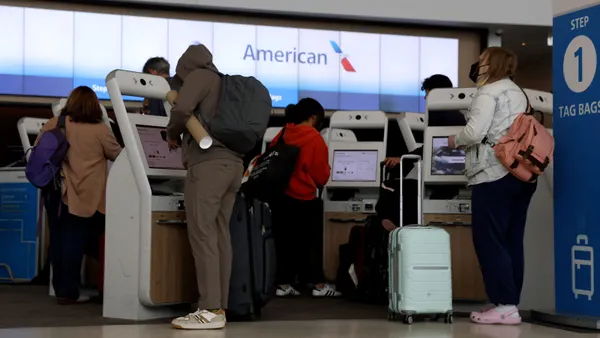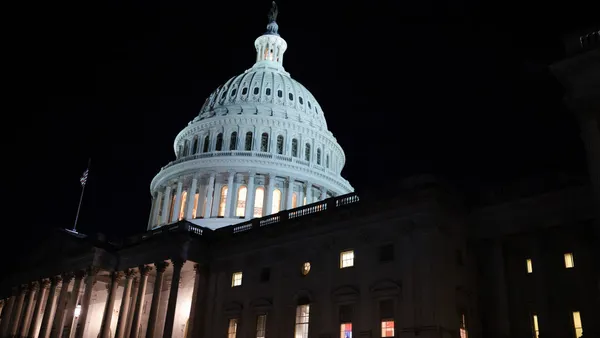Editor's Note: Technobabble is our occasional series looking at the more colorful sides of technology, including research-based musings that illustrate the CIO Dive Editorial Teams case for the future HQ2 location.
On a sleepy September morning at 6:08 AM ET, a bombshell went over the wire: Amazon was planning to build a second North American headquarters, aptly named "Amazon HQ2."
Amazon's requirements for HQ2 were simple:
-
A metro area with 1 million+ people
-
A "stable and business-friendly" area
-
A location, urban or suburban, that attracts and retains tech talent
-
Communities with creative proposals
By its deadline, 238 companies submitted proposals for HQ2, vying for the $5 billion investment in construction, the injection of 50,000 workers into the local economy and the potential for "tens of billions of dollars" in additional investment in surrounding communities.
Some proposals were more creative than others. For example, the mayor of Kansas City, MO., reviewed 1,000 Amazon products (they all got five stars), then donated the items to charity.
Sun Corridor Inc., Southern Arizona's economic development group, sent a 21-foot Saguaro cactus to CEO Jeff Bezos at Amazon. The company said it "can’t accept gifts" and donated it.
Thx @SunCorridorInc! Unfortunately we can't accept gifts (even really cool ones) so we donated it to @DesertMuseum https://t.co/ZJPQfs44cq pic.twitter.com/Fot06Kgs9P
— Amazon News (@amazonnews) September 19, 2017
Sad really, considering Amazon's Seattle greenhouses could have used it. You can never have too many plants.
While Amazon is sifting through its several hundred proposals, with a result expected in 2018, the CIO Dive Editorial Team predicts three contenders.
The case for Detroit
Amazon could align its legacy with the rebirth of a once flourishing industrial city and its reemergence in the global economy. Detroit should get Amazon's second headquarters.
The simple answer for Amazon's HQ2 is for a city well equipped with existing tech talent, but the reality is that talent goes where the work is. Additionally, as seen in the atrociously high cost of living in Silicon Valley and other metropolitan cities, workers are desperate for a financial reprieve.
The cost of living is 40% lower in Detroit compared to San Francisco, and the city has access to an international airport. While there is no streamlined public transit system to reach suburban communities, it does have top universities. The University Research Corridor, comprised of University of Michigan, Michigan State University and Wayne State, is one of "the nation's top research clusters," reports USA Today.
Still, engineers and programmers are already stationed in the Motor City, and an influx of new tech talent could kickstart the struggling local economy while creating a new tech hub.
Housing investments by Dan Gilbert and Quicken Loans are encouraging a more affluent community in downtown Detroit, but Amazon's varying pay scale should invite a broad range of skillsets to the city's communities.
Detroit has needed revitalization for quite some time, and a move from Amazon is an opportunity to better the city's workforce, education and economy. Besides, companies are increasingly gravitating towards cultivating their own skill sets as the talent gap grows, and this serves as an opportunity for Amazon to create an entire educational movement.
Detroit was already built on invention, and it's potentially up to Amazon to maintain it with innovation. And, if Amazon does not like it in Detroit, "a whole other country is just a bridge away." By Samantha Ann Schwartz, who has never been to Detroit.
Speaking of other countries ...
When Amazon put out its RFP, it said a North American city and did not specify whether or not it had to be in the U.S.
It is far more likely Amazon will choose a city that already has a booming economy, a robust tech workforce and a vast metropolitan sprawl that can accommodate Amazonians looking to live in the city or in the suburbs.
But here's another consideration: It is already hard enough to find tech talent in the U.S., so Amazon could look toward its Northern border and head to Canada, specifically Toronto.
Amazon won't be swayed toward Toronto because it can claim the Raptors or Drake (Seattle doesn't have a professional basketball or hockey team, which is frankly a travesty).
Instead it's the talent pipeline that holds such appeal. Though Toronto's mayor believes the city is at a disadvantage to win the bid because of the current U.S. political climate and turmoil in the Trump administration, it could actually work to its advantage.
With the changing U.S. attitude toward immigration — a battle the technology sector has taken up — a Canadian headquarters would allow Amazon to attract talent from around the world without worrying about whether employees could earn and keep their visas.
And Toronto is emerging as a tech hub in its own right. Alphabet's Sidewalk Labs is working with Toronto to create a high-tech waterfront, revitalizing a part of the city along the way.
Toronto is also the fourth largest city in North America and has a diverse population, with 39% of residents in the Toronto region born outside of Canada, according to the city's 190-page proposal.
The city has also made a pledge to increase the number of students with STEM disciplines by 25% over the next five years and have 1,000 Master's students working on AI disciplines in the same timeframe.
And you know it's a convincing bid when the Canadian Prime Minister Justin Trudeau personally pens a letter to Jeff Bezos and starts it with "Dear Jeff." By Naomi Eide, who grew up in the Seattle area.
Austin —►Austizon
An HQ2 discussion is not complete without the mention of Austin, TX. Moody's Analytics recently ranked Austin as the No. 1 most-appealing choice for Amazon. The report scored cities according to business environments, human capital, cost, quality of life, transportation and geography. The city was also rated the best place to live in the U.S. in 2017 by the U.S. News and World Report.
Moody's selected Austin for its strong labor force, which boasts 43% of workers with college or graduate training, an in-migration of IT professions and close proximity to the University of Texas. The city also has a lower cost of living than Silicon Valley or the Northeast, a high quality of life and good transportation, according to Moody's.
Forbes rated the City of Austin as the No. 9 employer in the country in June, and it is already home to the headquarters of Amazon's recent acquisition, Whole Foods, and close to an Amazon fulfillment center in San Marcos. Austin has the U.S.' largest Samsung facility, Dell, the second largest Apple facility, an IBM facility and the University of Texas.
Austin offers 4-hour flights to most locations in the continental U.S. and access to Mexico and Latin America, according to an Austin Economic Prosperity Commission recommendation. The city would therefore serve as an easy point from which to reach the tech, government and cultural centers of America and offer a convenient convergence point for other companies and leaders.
The city offers extensive fiber connectivity, the business friendly environment Texas is known for and proximity to a central logistics corridor, according to the recommendation. The formal bid did not offer Amazon any incentives, citing local government and public processes which must first be completed, but the state's governor has expressed willingness to work with the company on an incentive package, according to the Austin American-Statesman.
Steve Adler, mayor of Austin, said the city would be a "hospitable, purposeful collaborator that knows its strengths as well as its needs" in a letter to Amazon. By Alex Hickey, who is quite familiar with Texas thanks to a family trip at age 7.
But ... (of course there's a but)
Naomi Eide: Amazon's headquarters has completely reshaped the Seattle economy, adding $1.40 to the local economy for every dollar invested by Amazon. So between 2010 and 2016, Amazon estimates its local investments added $38 billion to the local economy.
While that is certainly great for business, there are adverse effects too: With the concentration of jobs downtown, it has contributed to dramatically increased rent, crippled already painful traffic patterns and changed the tone of usually sunny Seattle — to clarify, that's the personalities. Not the weather.
Hey @Amazon, we need to talk... #LoveLittleRock #HQ2 #AmazonHQ2 pic.twitter.com/KQXkA2PB1i
— Love Little Rock (@LoveLittleRock) October 19, 2017
(Just look up "Seattle Freeze," first mentioned in a 2005 article from The Seattle Times.)













